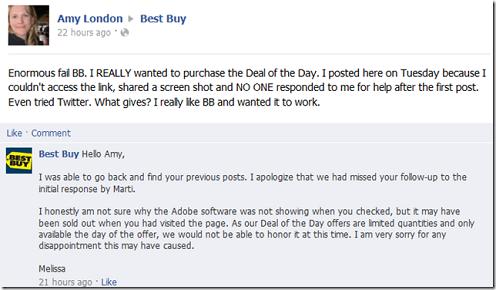There’s that old saying, “The fish rots from the head down.”
In the case of Best Buy, that may be an unfair assessment of the Brian Dunn era. But his resignation as CEO calls into question whether that mega-company has been beset by leadership problems that have trickled down from the corner office. On the heels of Best Buy announcing that it’s shutting 50 stores, is there anything else we can read into Dunn’s departure?
Best Buy is now connecting their decision to change leaders to unspecified “personal conduct issues,” but do the problems they have faced with Dunn go beyond that?
 Brian Dunn has an amazing history with Best Buy, having spent nearly three decades with the retailer. He started as one of those sales guys in 1985 and moved up through the ranks – ultimately becoming the head of the company in 2009. Dunn has seen Best Buy rise and even thrive in 2008 at the peak of the county’s economic slump. So what was the problem?
Brian Dunn has an amazing history with Best Buy, having spent nearly three decades with the retailer. He started as one of those sales guys in 1985 and moved up through the ranks – ultimately becoming the head of the company in 2009. Dunn has seen Best Buy rise and even thrive in 2008 at the peak of the county’s economic slump. So what was the problem?
Some feel that Best Buy’s problems are simply inevitable. Between Apple providing a superior retail experience and Amazon delivering the goods digitally, Best Buy found itself in the middle of “Disruption Central” – unable to maneuver out of the abyss, trapped by the “big box” shackles that first made them famous.
But you also have to wonder whether someone with a traditional retail background like Dunn was ill-equipped to do battle in the “Digital Wars” that have been raging for years.
With today’s e-Commerce growth and the consumer demand to be heard on social platforms – Best Buy’s customer experience has been lackluster. Read any thread on Facebook and people are clobbering Best Buy over the head with negativity.
I’m not suggesting that because Best Buy struggles with social media and had a series of e-Commerce snafus over the holidays, it explains their larger deficiencies. But for companies that come out of a traditional environment, doing battle with the likes of Steve Jobs and Jeff Bezos is daunting to say the least.
When a brand as big as Best Buy wrestles with developing a bona fide strategy when it comes to maximizing e-Commerce and elevating the consumer experience socially – does that come from the head down?
I found a blog post Dunn wrote just this past January. Here’s a peek behind the curtain to his thinking, leadership and concept of today’s consumer.
First, some believe the internet has made physical retailing (i.e., stores) irrelevant. There’s no doubt that the internet, and the mobile web in particular, have changed the way people shop, but there is strong evidence that consumers continue to value the experience of shopping in stores. A recent study by the NPD Group, a leading market research company, notes that nearly 80% of consumer electronics revenue still moves through physical stores. Additionally, approximately 40% of customer purchases made through Bestbuy.com are picked up in one of our stores. And the truth is, traffic in our physical stores increased in our third quarter and has been trending positively for most of the year.
Finally, there are those who question the validity of Best Buy’s business model. This misguided perspective is especially troubling for me, because it blatantly and recklessly ignores overwhelming evidence to the contrary. Best Buy is a financially strong and profitable company that has generated more than $2.6 billion in cash flows from operating activities in the first three quarters of the fiscal year. We also delivered positive operating income in each of the first three quarters of fiscal 2012. We grew total market share in the third quarter according to the most recent public data available. We have closed down certain operations that were not profitable, which we expect to have a positive impact on our earnings going forward. And we are focusing the company on areas where we see the greatest opportunities for growth and profit: mobile devices and connection plans; enhanced digital and e-commerce strategies; growth in our services business; and expansion of our established business in China.
Well, maybe all that sounds good to Wall Street, but in this fast-changing digital retail environment where brands, gadgets, and platforms are coming and going at breakneck speed, maneuverability and agility are requirements.
So is having a vision and a strategy that strengthens customer relationships while acknowledging change. To that kid in the blue shirt selling VCRs on the floor at Best Buy in 1985, what has transpired in the last five years must have been breathtaking and mind-boggling.
The qualities that media-related CEOs must possess have become exponentially more complex. A broad knowledge of digital, media, marketing and retailing would seem to be major requirements. How many of today’s CEOs possess that mix of financial and technical tools – not to mention great leadership skills – necessary to be successful in today’s environment?
I will sound like an educational snob when I say this because we all know brilliant people who never graduated from college – like Steve Jobs and Bill Gates. But when we read Dunn’s LinkedIn profile and see that his education apparently stopped at Edina West High School, it makes you wonder how someone with that background who never worked outside of Best Buy for his entire career could possibly navigate today’s turbulent waters.
Former Best Buy CEO Brad Anderson puts it this way: “You adapt to where the customer is going. They’ve got to find a CEO with the enthusiasm for that kind of change and vision.”
The demands have been ratcheted up, and while some will complain that CEOs are overpaid, I think we all know that the truly great, visionary ones are worth their weight in gold. Or iPads.
- Media And Technology In 2025: Believe It Or Not! - April 18, 2025
- In Radio, You Just Never Know - April 17, 2025
- The Secret To Making A Great Podcast (And Great Radio) - April 16, 2025





Leave a Reply